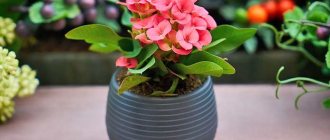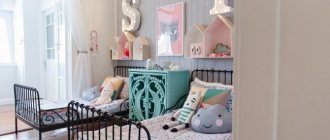To create coziness in the house, the hostess will definitely place several favorite flowers by the window. Tall and low, blooming and not - the range of crops is diverse, and everyone, if desired, will choose exactly the pet that their heart desires. But not all inhabitants of window sills are suitable for a recreation room or a nursery. From the point of view of Feng Shui, each plant has its own energy, which both helps a person and has a negative impact on his life and health. Flowers for the bedroom need to be selected especially carefully.
Qualities of plants with a “plus” sign
In the room where a person rests and spends the night, there should be indoor plants that promote relaxation. The beneficial properties of the green inhabitants of the bedroom window sill are:
- air purification;
- release of oxygen at night;
- lack of aroma;
- harmonization of space;
- ease of care.
Fresh air is very important during sleep. For a comfortable rest, oxygen must be purified from harmful impurities and chemical emissions. There are plants in nature that have suitable qualities for living in the bedroom. It is known that furniture, interior items, and flooring can “fog,” sending poisons into the surrounding space that are harmless to humans in small doses, but in significant concentrations cause insomnia, headaches, and chronic fatigue.
Avoid keeping strong-smelling flowering plants in your bedroom. A pungent aroma can cause migraines, respiratory spasms and anxiety. In addition, flowers with such a smell increase the frequency of nightmares. Important for indoor crops is the impact on the surrounding space. In the bedroom, the room where a person comes to relax and unwind, the atmosphere should be harmonious, calm and peaceful.
If both spouses share a bedroom, then flowers in pots should set them up not only for relaxation, but also for physical attraction to each other. In nature, there are plants that, when located next to the bed, increase the chance of offspring. There should be a non-capricious, easy-to-care flower in the rest room. The picky inhabitants of window sills lure all attention to themselves, preventing you from getting ready to relax.
How to place plants in the bedroom
What indoor flowers can be taken outside in summer?
The interior of the bedroom is usually kept in calm colors with diffused light. And the plants in this room should set the mood for calm and relaxation from the worries of the day.
To make plants liven up the space of a room, you can use simple tips:
- choose healthy specimens without damage;
- It is better to purchase flowers that are already formed and developed;
- give preference to species that are not difficult to care for;
- Do not place flower pots at the head of the bed;
- flowers standing on the floor should not interfere with movement;
- stands for plants must be stable;
- the size of the flowers should correspond to the size of the room: you should not place a huge tub with an adult bush in a small one;
- be sure to take into account the lighting of the room during the day, its orientation to the cardinal points;
- find out whether the plant is poisonous or causes allergies.
Properties with a minus sign
What are the harmful qualities that a plant must have in order not to stand in the bedroom? This:
- strong smell;
- virulence;
- natural “vampirism”;
- oxygen absorption.
The pungent odor causes headaches and sometimes mental disorders. Hallucinations, sleep disturbances, anxiety are side effects of a fragrant room guest. In addition, among the green inhabitants of window sills there are also poisonous representatives. Such plants may emit poisonous fumes or oils, or cause burns and rashes if accidentally touched. Poisonous flowers belong in a home without children, and certainly not in the master bedroom.
Among pets there are also those that absorb energy. A plant favorable for the bedroom should give off or be neutral, and “pumping” leads to the fact that a person feels overwhelmed and tired in the morning. There are flowers that actively absorb oxygen and release carbon dioxide at night. This “breathing” contributes to a deterioration in the atmosphere in the room and poor sleep.
Basic rules for caring for flowers
To prevent beautiful indoor blooms from negatively affecting the health of children and animals with their toxins, follow several rules for caring for them:
- install them in the room so that they are out of the reach of children and animals;
- You constantly need to clean the pots from dry leaves, wipe the leaves, and water them on time;
- when buying a flower you like in a flower shop, you need to ask the seller whether it is toxic and what harm it can cause to children and animals;
- When cutting plants, wear gloves and be sure to wash your hands after work;
- Do not scratch your skin or rub your eyes while working;
- destroy insects and discovered larvae;
- check to see if there are fungi and mold, if so, immediately begin treating the bloom;
- change any cracked pots immediately;
- trim any tendrils that appear in a timely manner;
- if there are allergy sufferers in the family, then think about whether it is worth keeping house plants in the house;
- do not forget to pour clean water into your animals' cups;
- When working with a flower garden, keep animals and children away.
What flowers can you choose for the bedroom?
The following indoor flowers will create a favorable atmosphere in the bedroom and set the mood for a night's rest:
- aloe;
- gardenia;
- geranium;
- Money Tree;
- dracaena;
- Kalanchoe;
- lavender;
- laurel;
- mint;
- palm;
- spathiphyllum;
- rosemary;
- violet;
- chlorophytum;
- citrus.
A plant with flat leaves, framed on the sides by thorns - aloe - has long been close to humans. More than one book has been written about its healing properties, and its beneficial effects have been proven by science. A native of desert arid areas, it is suitable for being in a rest room, as it releases oxygen abundantly and purifies the air of harmful impurities.
Geranium and gardenia
Kalachik or geranium is a unique fragrant flower, allowed for placement in the bedroom. The bright inflorescences of the plant are pleasing to the eye and calm, and the smell relieves headaches and tension. In the room where there is a flower, you always sleep well and peacefully. When placing the little potty in the relaxation area, you need to place it away from the bed, and keep in mind that one pot is enough for 15 meters.
The aroma of gardenia has a calming effect. German scientists have proven that the plant relaxes and sets the body to rest. The flower is a natural sleep aid, and if you smell it for a few minutes, you will feel sleepy.
Tulips in the bedroom can lead to hair loss.
Crassula, dracaena and Kalanchoe
The money tree is known to every modern resident of megacities. This plant is associated with the Feng Shui belief that it brings money into the house, and if it begins to wither, then the owner will face illness and failure in the future. The stocky inhabitant of the windowsill is also popularly called the fat woman. The flower has a number of useful properties that speak in favor of its growth in the bedroom. Culture is a good natural air filter.
A flower called dracaena can and should be kept in the room for night rest, as it cleanses the atmosphere of the room from harmful chemical impurities emitted by furniture and other interior items. Also, the inhabitant of the window sill produces oxygen in the dark.
A flower with dense green leaves and small Kalanchoe buds has a positive effect on the human nervous system. It makes breathing easier when you have a runny nose, relieves stress and normalizes sleep.
Lavender, palm and spathiphyllum
Lavender is a recognized natural sedative. A bush with delicate purple flowers growing on the windowsill will make you sleep soundly and wake up good . Mint, bay leaves, and rosemary grown in a pot work in a similar way.
A palm tree can become an unexpected guest in the bedroom. According to the teachings of Feng Shui, it represents growth and the desire for success. In the relaxation room, the plant will help cope with bad mood and gloomy outlook on life. The culture is especially recommended for melancholics and skeptics.
Spathiphyllum is also called the flower of peace or women's happiness. Its rich green leaves and delicate white flowers harmonize feminine energy. The plant enriches the room with oxygen and humidifies the air 24 hours a day; moreover, it serves as a natural pest control, killing pathogenic bacteria. It is recommended to get spathiphyllum for single young ladies, as it will attract love to a woman.
Be sure to read about the flower - angustifolia lavender. Interesting plant.
Violets, chlorophytum and citruses
Delicate multi-colored violets are welcome guests in bedrooms and recreation areas. The flower harmonizes a person’s energy and pacifies him. The culture can be called an anti-stress flower, which calms and stabilizes the functioning of the nervous system. A plant with fluffy elastic leaves and bright inflorescences strengthens family relationships and revives the extinguished feelings of spouses.
Chlorophytum is a natural air purifier and humidifier. Four striped flowers per day can completely cleanse a room of the effects of combustion and chemicals. The culture destroys microbes and pathogens.
A person feels good in the bedroom with citrus fruits. The oils released by indoor oranges or lemons have a positive effect on the nervous system and mucous membranes of the body. The plant disinfects the room and actively absorbs carbon dioxide. During the day, a lemon in a pot produces 85 useful substances that have a positive effect on the human condition.
Size and location
Floral designers allow the presence of large plants in the bedroom: dracaena, elephant yucca, monstera, etc., since the room is not intended for outdoor activities and flower pots will not interfere.
One large plant or several small ones - the choice is yours
Naturally, potted flowers should not block the passage to the bed and, preferably, not stand close to it. The fact is that often in stores, plants are treated with chemicals, in particular fungicides, in order to prevent fungal diseases, mold or mites, which obviously will not benefit the person sleeping next to them.
You can create a composition with your own hands from several plants. It will look especially impressive if you place it in front of a mirror and softly illuminate it.
In very small bedrooms there is also room for one or two beautiful flowerpots: hung on the ceiling or wall, or displayed on the dressing table, they will add sophistication and completeness to the interior. (See also the article Color of wallpaper for the bedroom: which one to choose.)
Indoor plants do not have to grow in the ground - cut bouquets of roses, peonies and even ordinary field daisies on the windowsill will delight your eyes when you wake up for several days.
Who should not be seated on the windowsill in the recreation area?
Flowers that are best not to be kept in the bedroom include:
- adenium;
- hibiscus;
- dieffenbachia;
- cactus;
- spurge;
- monstera;
- oleander;
- orchid;
- nightshade;
- ivy;
- cyclamen;
- ficus;
- yucca.
Original and attractive, adenium has heavy energy and should not be placed in the bedroom. The sap of the plant is poisonous and causes burns to the skin. When the leaves of the flower enter the body, poisoning occurs. Hibiscus (or Chinese rose) is a natural "vampire". The plant pumps out energy in the room where it is located.
Interesting! An article about the amazing plant Yucca Filamentata.
Dieffenbachia, cactus and spurge
Dieffenbachia is a poisonous crop. Its juice, if it comes into contact with the skin, causes burns and redness, and if it penetrates inside, it causes severe poisoning. From a Feng Shui point of view, cacti make people angry and should not be kept near the bed. But the therapeutic effect of the desert plant is great, it improves sleep and “drives away” nightmares. It’s up to you to decide whether to place a prickly friend in the bedroom or not, and it’s better to listen to your feelings.
All varieties of milkweed are undesirable for the bedroom. Plants are poisonous species that inhabit window sills. If the milk from the flower gets into the eyes, it will cause swelling and, in some cases, blindness.
Monstera, oleander and orchid
A plant called monstera even has a name associated with monsters. If a flower is placed in the bedroom, it will deprive a person of energy, and after a night’s rest, the owner of the culture risks waking up broken and feeling tired and apathetic.
Oleander flowers are a strong allergen. The smell of the plant, when inhaled for a long time, causes spasm of the respiratory tract and dizziness. The exotic orchid is a natural “vampire”. While in the bedroom, she feeds on the energy of her owner. A flower with beautiful buds can affect night's rest, disrupting sleep.
Nightshade, ivy and cyclamen
The miniature nightshade bush, dotted with inviting orange berries, is an unwelcome guest in the bedroom. The plant is poisonous, and once in the human stomach, it causes severe poisoning and vomiting. Signs of nightshade poisoning: drowsiness and abdominal pain.
All types of ivy and other climbing plants are considered unsuitable for night rest areas. Representatives of the flora family are natural “vampires” that feed on human energy. Some people believe that keeping cyclamen near the bed is dangerous, as it is poisonous. Others claim that the plant has a number of healing properties and increases sexual desire in partners.
Ficus and yucca
Ficus is a plant that has a “recharging” effect. The energy of the flower is so strong that it gives a boost of energy for the whole day. This is why ficus should not be placed in the bedroom. Many people have yucca growing on their windowsill. With prolonged contact with an exotic flower, a headache occurs and health worsens.
Interesting! Read about the beautifully blooming Brugmansia flower.
Dieffenbachia
A spectacular plant with large variegated leaves native to South America. Suitable for lovers of tropical themes, unpretentious, grows quickly.
The flower looks great in any interior, but is not recommended for the bedroom: a small drop of juice from the trunk can cause irritation, pain and swelling if it gets into the eyes or sensitive areas of the skin.
It is especially important to take care of allergy sufferers, small children and pets. If you chew the leaf, serious poisoning can occur, including anaphylactic shock. Euphorbia has the same dangerous properties.
What is Feng Shui against?
According to the teachings of Feng Shui, an indoor flower should suit both the place and the owner. It is not for nothing that not only eastern peoples have beliefs that some plants attract love, wealth and prosperity, while others, on the contrary, for a long time prevent single people from starting a family, and the poor from getting rich. Popular wisdom does not advise single people to keep flowers such as:
- begonia;
- birch;
- hibiscus;
- orchid;
- fern;
- Christmas star.
- tuberose.
They believe that begonia attracts the attention of the opposite sex. Lonely owners of the plant will not be able to achieve family happiness for a long time.











